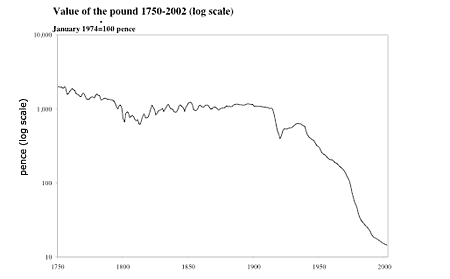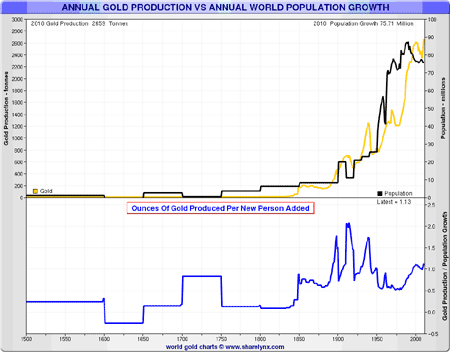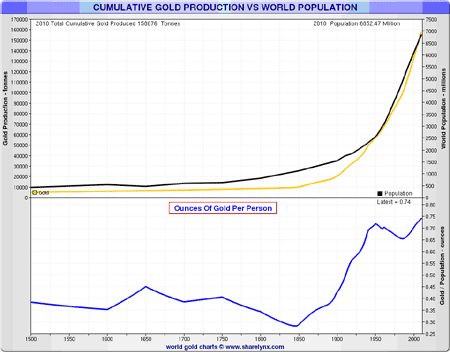Will the gold standard ever make a comeback?
Over the years, gold has proved an excellent store of wealth. As a medium of exchange, however, it's been found wanting. But Dominic Frisby believes there's a future for gold as a currency, and a return to the gold standard is entirely possible.
Get the latest financial news, insights and expert analysis from our award-winning MoneyWeek team, to help you understand what really matters when it comes to your finances.
You are now subscribed
Your newsletter sign-up was successful
Want to add more newsletters?

Twice daily
MoneyWeek
Get the latest financial news, insights and expert analysis from our award-winning MoneyWeek team, to help you understand what really matters when it comes to your finances.

Four times a week
Look After My Bills
Sign up to our free money-saving newsletter, filled with the latest news and expert advice to help you find the best tips and deals for managing your bills. Start saving today!
What we use as money today is either issued by governments, or created by banks through the issuance of debt. The status of money is protected by the law we must use what we use as money and by the fact that taxes are levied in this money.
But underneath it all, there's nothing there nothing tangible anyway. It's just a law, a man-made law. It's not even a proper promise. The writing you see on a £20 sterling note 'I promise to pay the bearer on demand the sum of twenty pounds' is in effect a promise to pay something that doesn't exist. It's a great big load of old baloney.
Modern money is a man-made phenomenon, responsible in my view though rarely held culpable for many of the economic problems the world faces today.
MoneyWeek
Subscribe to MoneyWeek today and get your first six magazine issues absolutely FREE

Sign up to Money Morning
Don't miss the latest investment and personal finances news, market analysis, plus money-saving tips with our free twice-daily newsletter
Don't miss the latest investment and personal finances news, market analysis, plus money-saving tips with our free twice-daily newsletter
But nature has provided an alternative.
What is money for?
Broadly speaking, money has two main uses. One is as a medium of exchange. The other is as a store of wealth. (You might find other characteristics in an economics textbook, but these are the crucial ones.)
Our modern fiat system of money is a quite brilliant medium of exchange. Thanks to the internet, you can buy almost anything anywhere in the world and pay the seller instantly. Short of a single global currency that eliminates the need for foreign exchange, it's hard to see how you can improve on modern money as a medium of exchange.
But it's a rotten store of wealth. Every year it buys you less and less.
Here's a chart from a House of Commons paper that I'm fond of posting. It shows the purchasing power of the pound since 1713.

This is why anyone with money to save and invest tends to buy anything 'real' that they can, from houses, to stocks, to fine art. They're all far better stores of wealth than cash. In fact, owning assets has been the only way to keep up with inflation.
But the trouble is, more and more people pile into an asset-class as they see it rise. Then they pile in with leverage (borrowed money). And that's how we end up with these wretched boom-bust cycles.
All because modern money fails in its second purpose to be a store of wealth.
Could we return to the gold standard?
Gold has, of course, proved to be a wonderful store of wealth. It lasts pretty much forever. And it buys you as much as it ever did as much energy, clothing, bread and meat as it did 50, 500 or even 5,000 years ago. It's why, in this era of negative real interest rates (ie rates are negative once you adjust for inflation), more and more people are choosing gold as a means to store their wealth.
But as a medium of exchange, it's been found wanting.
From about 1700 on, people began to prefer to use paper certificates representing gold which eventually became bank notes in the marketplace to gold itself.
And the chances of my going to Tesco's some time in the not-too-distant future and doing my weekly shop with a gold sovereign are, at best, remote.
But that doesn't mean gold won't be used again as a medium of exchange. Digital gold currencies where ownership of gold safely stored in vaults is transferred digitally, just as ordinary fiat-money transactions take place today are already starting to be used across the net. In theory at least, digital gold has the potential to become as good a form of exchange as any other digital currency.
So gold has re-emerged as a reliable store of wealth. And it is starting to re-emerge as a currency. It's certainly not impossible in fact to my mind it's probable that it will eventually regain some kind of 'official' currency status at some stage.
In fact, since gold was at $500 an ounce, I've been arguing that a return to some kind of gold standard is not just possible, but likely. I have been branded mad, insane, lunatic, barking and a lot worse (although many of those same people are now emailing and phoning me up asking how to buy gold).
There's just enough gold to go round
But there is one commonly cited argument against all this. And that is that the world could never again use gold as money, because there isn't enough of it to go round.
But there is. There is just as much gold per person as there always has been. In fact there is more.
Cast your eye over the following chart, which Nick Laird of Sharelynx has prepared for me. (Thank you, Nick, once again.) The black line shows world population growth, and the yellow line shows annual global gold production since 1500.
You can see the remarkable correlation. Annual gold production and world population growth rise very much in proportion to one another.

The next chart shows cumulative world gold production against world population. The correlation is even more apparent.

At the bottom in the blue line, we see ounces of gold per person in the world. There is more gold per person than there has ever been. But, at just an ounce per person, it is still extremely rare, so that gold has value.
With gold supply growing at virtually the same rate as world population, you can see why gold keeps its purchasing power over millennia, unlike modern fiat currencies, the increasing supply of which dwarfs population growth. Gold is very much a natural form of money. Which is why it's the only currency in history that has never disappeared. Which is just one more point to add to your ever-increasing list of reasons to own gold.
Our recommended article for today
Don't trust the government with your pension
The latest government pension reforms could dash any hopes you had of retiring comfortably. But there are ways to avoid squandering your money. Bengt Saelensminde explains how to avoid the government's pension scam.
Get the latest financial news, insights and expert analysis from our award-winning MoneyWeek team, to help you understand what really matters when it comes to your finances.
MoneyWeek is written by a team of experienced and award-winning journalists, plus expert columnists. As well as daily digital news and features, MoneyWeek also publishes a weekly magazine, covering investing and personal finance. From share tips, pensions, gold to practical investment tips - we provide a round-up to help you make money and keep it.
-
 Should you buy an active ETF?
Should you buy an active ETF?ETFs are often mischaracterised as passive products, but they can be a convenient way to add active management to your portfolio
-
 Power up your pension before 5 April – easy ways to save before the tax year end
Power up your pension before 5 April – easy ways to save before the tax year endWith the end of the tax year looming, pension savers currently have a window to review and maximise what’s going into their retirement funds – we look at how

